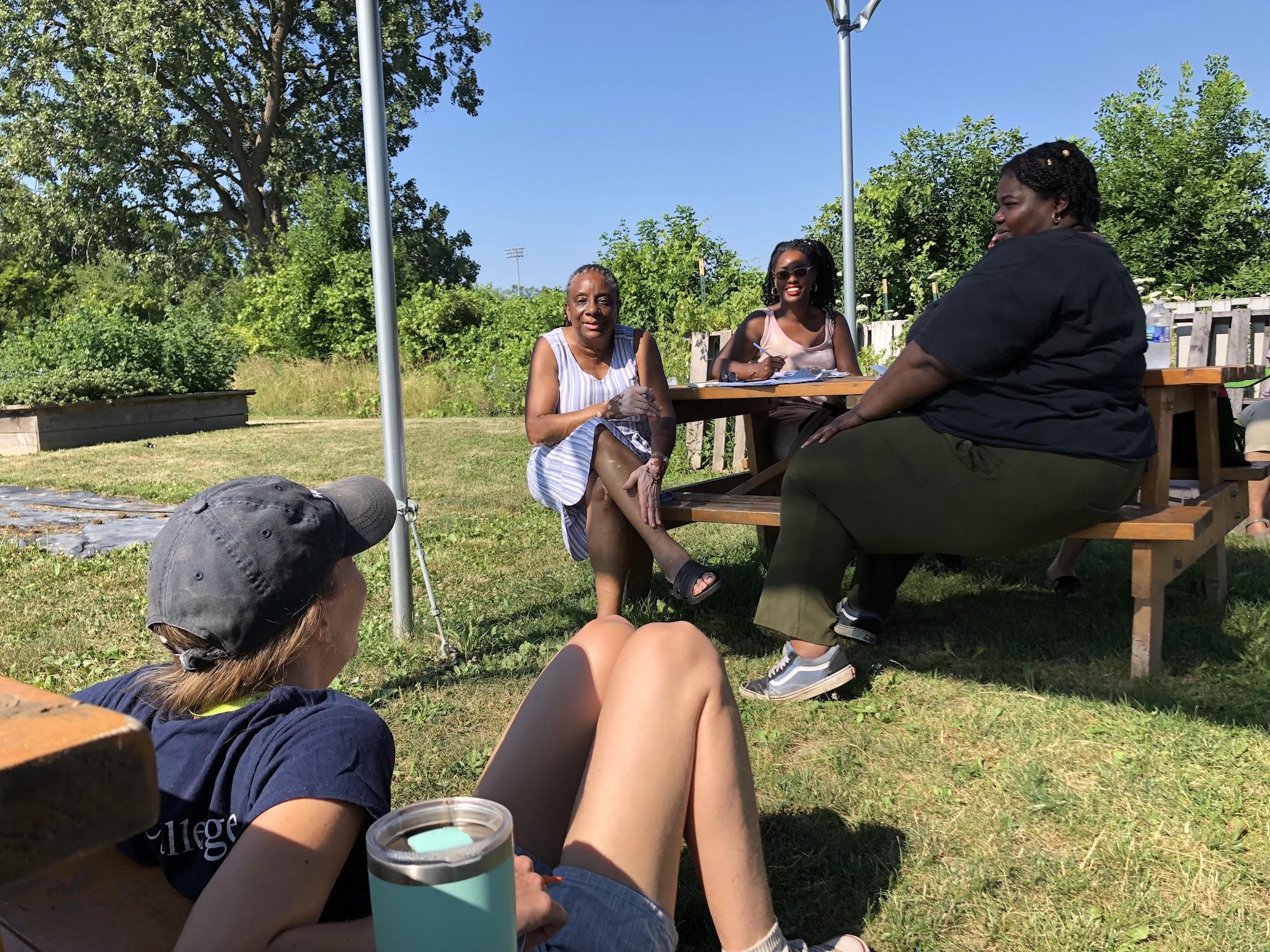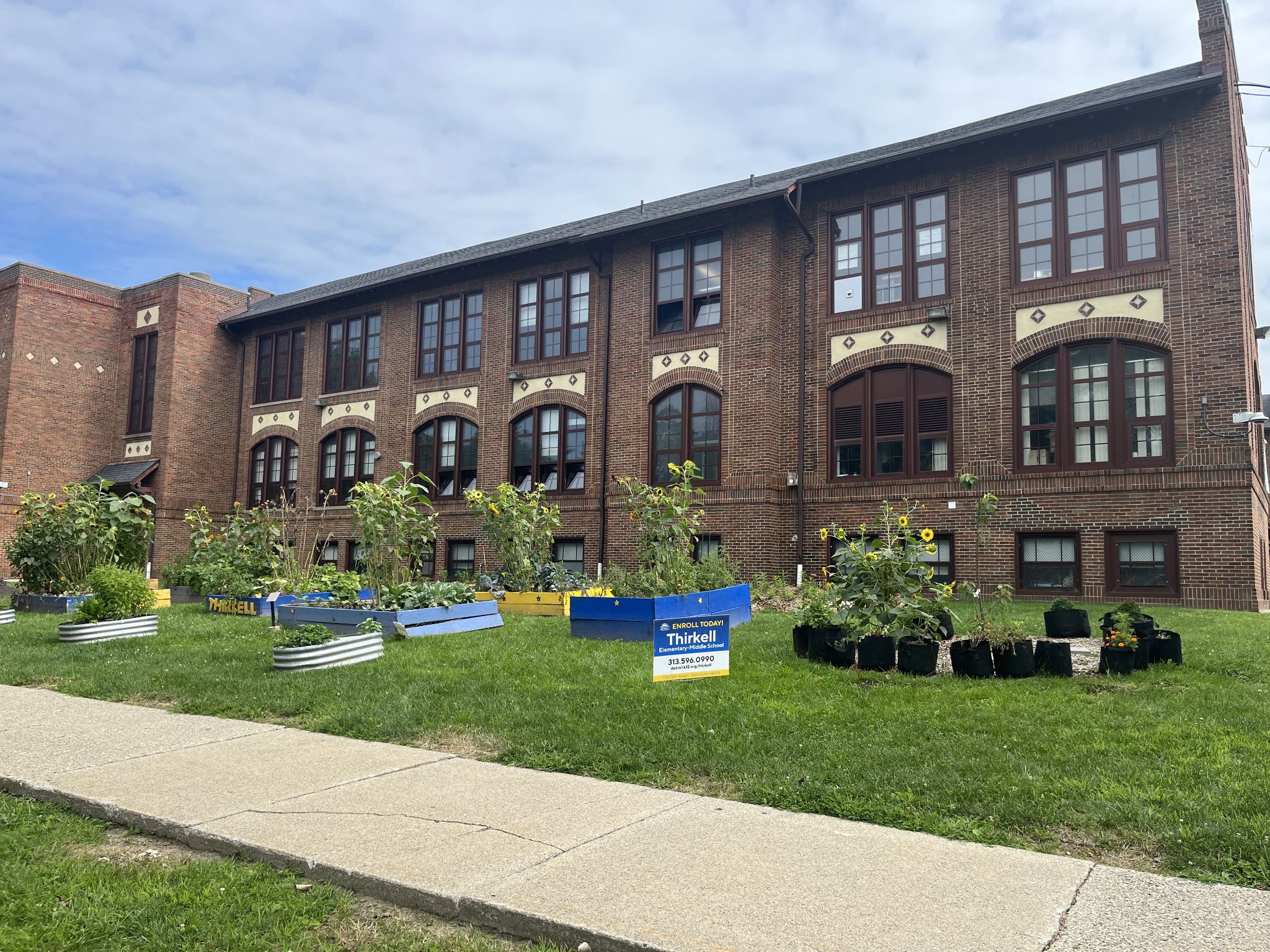Teaching Science Outdoors: Planting the Seeds of Curiosity
- Gail Richmond, Ph.D.
- Associate Chairperson and Professor
- Director of Teacher Preparation Programs
- Department of Teacher Education
- College of Education
Project Overview
- Funded with a $2 million National Science Foundation grant, Teaching Science Outdoors: Urban Partnerships (TSO-UP) supports urban elementary teachers in teaching science in local outdoor spaces.
- Science educators and project staff meet regularly to share their experiences and visit other outdoor spaces in their communities.
Products/Outcomes
- A professional learning community in which teachers can exchange ideas and develop strategies for using outdoor spaces in which their students can learn and grow.
- Gardens, greenhouses, outdoor classrooms, tree plantings, and more.
- Scholarly papers and conference presentations on virtual professional learning communities, a social justice teaching orientation, and peer and systems support for professional change.
Partners
- Belle Isle Conservancy
- Detroit Public Schools Community District
- Ebersole Center
- Lansing Public Schools
- Potter Park Zoo
Form(s) of Engagement
- Community-Engaged Research
- Community-Engaged Service and Practice

Science teacher Shirley Brezzell (left, at picnic table) shares her experiences with other teachers who participated in a professional learning community as part of Teaching Science Outdoors: Urban Partnerships.
When Detroit public school teacher Shirley Brezzell introduced a unit on squirrels and their habitats, she took her eager third graders outside.
The children looked all around the school grounds, but they did not see a single bushy tail. She asked them to think about why.
“They realized that there were no trees,” she recalled. “So there were no squirrels.”
Brezzell took matters into her own hands, launching a transformation of the school grounds that has provided her students with an outdoor oasis where they can learn about science—and just be kids.
She contacted a nonprofit devoted to ensuring there are trees in every part of every city. Today her schoolyard is lined with 60 trees and features picnic tables, a greenhouse, and a flourishing garden. Just recently she spotted a gray, black, and red squirrel.
Brezzell is among dozens of educators in the cities of Detroit and Lansing who have partnered with Gail Richmond, an MSU professor of science and urban education, and her project team to uncover and exchange ideas about creative ways to teach science outdoors in urban schools.
Funded with a $2 million National Science Foundation grant, the goal of Teaching Science Outdoors: Urban Partnerships (TSO-UP) is “to support urban elementary teachers in teaching science in local outdoor spaces in meaningful and culturally responsive ways,” said Richmond.
Research shows that being and learning in outdoor spaces has psychological, social, emotional, and cognitive benefits, even more so in the wake of the COVID-19 pandemic, she said.
“We want teachers to feel comfortable with such spaces and with each other and to collectively gather strategies for doing that,” said Richmond, whose research has focused on teaching and learning in high-poverty settings within and outside traditional classrooms. “We want kids to feel like they are comfortable, belong, and are welcome in those spaces, because they often are not.”
Beginning in 2019, cohorts of a dozen teachers and informal educators have participated in school-year and summer professional development opportunities to explore ways to enact standards-aligned approaches in culturally responsive ways using the outdoors as a learning space.
During the summer, classroom teachers, along with informal science educators and project staff, spend three days brainstorming and exchanging ideas—at Belle Isle in Detroit or Potter Park Zoo in Lansing. They follow this by spending several more days visiting each other’s schools and schoolyards. During the school year, teachers meet once a month virtually and in person to share their experiences and challenges and to visit other outdoor spaces in their communities.
“We are not a curriculum development project,” said Richmond. “We just try to enhance what they are doing and create these professional learning communities so that educators can use each other as resources as well.”

The TSO-UP program helped teacher Emma Howland-Bolton reimagine her schoolyard at Thirkell Elementary-Middle School in Detroit. Her students learn outdoors, raise flowers and vegetables, and helped build a rain garden among other projects.
From ‘Bereft’ to Beautiful
Emma Howland-Bolton teaches fourth grade at Thirkell Elementary-Middle School in Detroit’s Virginia Park neighborhood. Before joining TSO-UP, “I had been convinced that our schoolyard was sort of bereft.”
Becoming part of a professional learning community opened her eyes to new possibilities. “Getting to see other people’s schoolyards ... was really eye-opening and pushed my thinking about what was possible at my school,” she said.
Emboldened by what she saw, Howland-Bowland spearheaded the installation of a 500-square-foot rain garden. Not only did the rain garden prevent the kindergarten classrooms from flooding, but it has become a peaceful space for her students to enjoy. This year she and her students also built an outdoor classroom using materials donated during the COVID-19 pandemic.
Using TSO-UP funds, she has purchased child-sized shovels that her students have used to create butterfly and vegetable gardens as well as other materials.
Howland-Bolton draws much inspiration from Brezzell, who teaches fourth and fifth grade science at Mackenzie Elementary-Middle School on Detroit’s West Side. Following the COVID-19 shutdown, “I inherited a raggedy hoop house, four picnic tables, and some garden boxes that were literally falling apart,” Brezzell recalled.
She envisioned something better for her students. “I just wanted them to go outside and play in the dirt,” she said, noting that many of them don’t have that opportunity. “Part of my motivation was to create a safe space, a quiet place, a haven for my kids outside.”
With help from her students and volunteers, Brezzell cleaned out the hoop house, put down a weed barrier, and spread mulch. She and her students are planning a winter garden. “We’re going to grow a meal,” she said. Last fall, they harvested vegetables from the garden they had brought back to life.
Her fourth and fifth graders also took pride in building sensory gardens filled with sand and toys for children in preschool through third grade on the autism spectrum.
Beyond Science
Beyond learning about science, outdoor education also helps students see the connections between their experiences and social issues affecting their communities, which is another goal of TSO-UP.
“Our goals in the project were to support elementary teachers in urban districts in basically using outdoor spaces in meaningful ways to help their students learn science,” said Richmond. “But just as importantly, to use those outdoor spaces to address issues that were important to the kids that were social justice oriented.”
For example, the students at Brezzell’s school—many of whom move frequently—were “over the moon” for a moveable garden project. Using portable grow bags, they planted and harvested fresh potatoes, which some students had never tasted before. “That opened up a whole discussion of how they live in a food desert, and more discussion about healthy eating,” Brezzell said.
They also enjoyed tasting several varieties of tomatoes, butternut squash, and collard greens. “Then we were able to talk about Black food” and why greens have been a staple in the African American diet, she said.
At Thirkell, Howland-Bolton learned that one of her rising fourth graders had died over the summer. His classmates planted a tree in his memory. “The schoolyard became a place where we got to recognize what had happened and spend time talking about [the student]. It’s an opportunity to keep him in our conversations.”
Nurturing Curiosity
Teachers’ experiences have helped drive the direction of TSO-UP from the start. Initially, the grant was directed toward a designed-based research focus, developing specific strategies for teaching science outdoors. However, it soon became evident that teachers favored a professional learning community where they could learn from one another.
“As with everything else in this project, we shifted our focus to be more responsive to participants’ needs and priorities,” Richmond said. “And that, combined with our focus on social justice, has yielded some very productive research questions being asked.” Scholarly papers and conference presentations also are emerging from the work, focusing on such ideas as the power of virtual professional learning communities, factors supporting the growth of a social justice teaching orientation, and peer and systems support for professional change.
For example, Brezzell and Howland-Bolton recently presented at a place-based education conference in Grand Rapids. Richmond has also sought a no-cost extension of the NSF grant that would allocate unused funds to getting more teachers involved and facilitating discussions between Detroit and Lansing participants.
The learning community has been powerful not only for the teachers, but also for Richmond. “People are just really supportive of each other, acknowledging the challenges they each face, and coming up with ideas.” Participants, in turn, come away thinking, ‘Yes, I can do this.’”
“We want to expand the notion of where teaching and learning can happen,” said Richmond, adding that understanding the world better does not necessarily happen in a science classroom. “We want the kids to be curious. We want them to be inquisitive about things, so they are capable and ready to be scientists in any context.”
- Written by Patricia Mish, University Outreach and Engagement
- Photographs courtesy of Shirley Brezzell and Emma Howland-Bolton